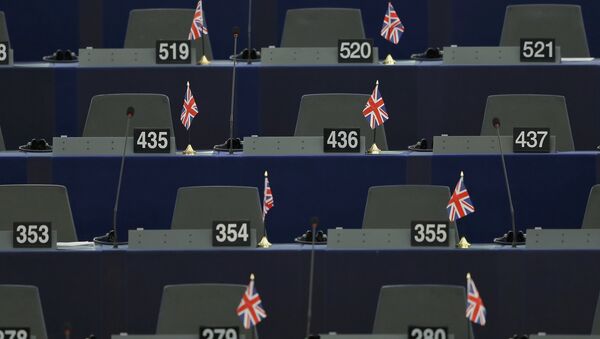UK Prime Minister Theresa May — in her letter to European Council President Donald Tusk, formally notifying him of Britain's withdrawal from the EU — said she wanted talks on a new bilateral trade deal to go in parallel with discussion over its exit — including its 'divorce' bill and clarification of the rights of EU citizens in the UK.
However, MEPs made clear, in its plenary session, May 18, that negotiations over Britain's exit fee — the amount it owed under existing obligations — as well as the issue over EU citizens' rights would have to come ahead of any trade deal.
MEPs discussed #Brexit negotiating guidelines with @JunckerEU and @MichelBarnier. Find out what they had to say ➡ https://t.co/yzF1rY4OCH pic.twitter.com/e8vb1pDmlB
— European Parliament (@Europarl_EN) 19 May 2017
"The European Union never likes to take things in parallel. It works in a gradual process. This is something that the EU will want to maintain with the UK as well. It will tackle each issue first, before moving on to a trade deal," Dr. Theofanis Exadaktylos, Senior Lecturer in European Politics in the University of Surrey, England.
"The UK first needs to leave and then we can decide what sort of relationship it scan have with the EU in terms of trade. That makes perfect sense, because you cannot start agreeing on a bilateral trade deal while there is another regime in place that still remains to be settled.
"It would be like trying to get another mortgage while you still have a mortgage with your current house. What the EU is saying is that, once you're out of the EU, you will just have to wait in line like everybody else," Dr. Exadaktylos told Sputnik.
Most important is that our conduct in #Brexit talks shows EU27 at its best: in terms of unity, political solidarity and fairness towards UK.
— Donald Tusk (@eucopresident) 17 May 2017
"Let's consider the fact that there is a trade deal in place with Singapore, which has been in place since 2013, which still remains to be ratified as a trade deal — and that's four years. So, if we think about previous bilateral trade deals with different countries, it takes a lot of time. It's about trying to coordinate 27 member states' interests, plus any business interests that come with it.
Theresa May has called a snap general election, June 8, in order to gain a bigger majority in parliament, demanding British citizens give her a mandate to fight for the best deal for Britain.
"The next five years are the most challenging that Britain has faced in my lifetime. Brexit will define us: our place in the world, our economic security and our future prosperity. So now more than ever, Britain needs a strong and stable government to get the best Brexit deal for our country and its people," May said in the foreword to her party's 2017 election manifesto.
This manifesto is our plan for a stronger, fairer, more prosperous Britain. pic.twitter.com/Hj5yzlbhxh
— Theresa May (@theresa_may) May 19, 2017
"I think she was [unrealistic]. I think she was just trying to set the tone on how she would try to negotiate things. We still have two years ahead of us — and that's big in terms of political time. Maybe some things can be sped up, but I am not sure the two processes can go in parallel," Dr. Exadaktylos told Sputnik.
"I think what Theresa May was suggesting in that original letter was more a political statement rather than a technocratic statement. I think it was to satisfy the internal [British] public, while I think the knows what she can and what she cannot within the European Union."


